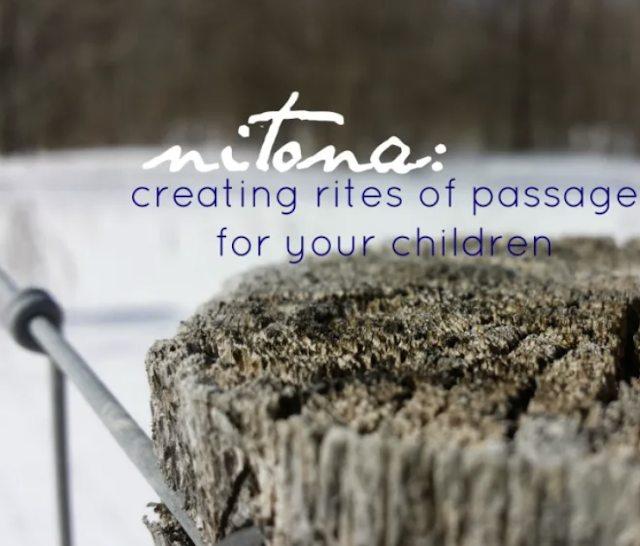Our 13 year old just got back from his Nitona, full of shared secrets and a new kind of relationship with the men in our family.
Our oldest was the first to try out this new tradition, and now our youngest is excited about when her day will come too.
Early on, we decided that we wanted our children’s journey through childhood to be marked with intentional milestones.
Ask the closest 20-something “When did you become an adult?”.
They may say something like “I’m still waiting” or “When I got drunk for the first time” , “When I got my driver’s license” or “When I lost my virginity”.
Western culture is amazingly progressive and fast-paced, but we’ve lost some things along the way.
One of those things is a celebration of the different stages of life. Sure, we have celebrations and ceremonies that go along with birth, marriage and death. But birth and death are not events that we’ll remember, and marriage is not the same for everyone.
Kids may even go looking for that one thing that will mark their progression into adulthood, that one moment when they’ve arrived and when they finally “became a man” or “became a woman”.
We wanted to make becoming a teenager and becoming an adult an event for our children so that they don’t have to go searching for it on their own. We wanted to take the opportunity to share some thoughts and advice with them, to be intentional about pouring into them as they embark on a new stage of life.
Our 13-year-old rite of passage is fairly simple, and it follows the pattern of various rites of passage around the world and from culture to culture: separation, segregation, and reintegration.
The child goes away for about 24 hours with some of the important adults of the same gender in his life. They share wisdom, blessings, hopes and dreams with the child. Then the child is sent off for a few hours by themselves with a small task — this is the separation and segregation aspect. This marks the passing from one stage of life (in this case, childhood) to the next (the start of the journey to adulthood). And then they are brought back to the rest of the group, officially a teenager.
We’ll do something very similar for each of our children’s 18th birthdays, as a way to mark the final transition to adulthood. Our kids will truly have a day that they can point to on which they “became a woman” or “became a man”.
Maybe you already celebrate transitions like this with Confirmation or a Bar or Bat Mitzvah. But what if, like us, you don’t have a specific celebration to mark milestones like that?
Create your own!
Plan a weekend away for your child that follows the basic pattern of separation, segregation and reintegration.
Separation: In my opinion, it’s essential that the rite of passage take place somewhere out of the ordinary. It should be somewhere relatively isolated. In our sons’ cases, that meant going camping at a provincial park. This makes it easier for your child to spend uninterrupted time with the important adults in their life, and to enable the adults to share their hopes, blessings and wisdom with the child in a quiet and somber atmosphere.
Segregation: For our children, this meant being alone in the outdoors for a number of hours. They were given a special message from their father and I, and were given things to think about and a task to do while they were there. We called this their “Nitona Quest”.
Reintegration: When our sons each returned after their quest, they had officially completed the transition to teenage-hood!
Our overall theme for the Nitona is that this is a time for our children to begin to take more responsibility for their own actions, attitudes and spiritual lives, and for them to understand that their journey toward adulthood has started. It’s a chance for them to start to look toward the future and to think about how they want their life to play out.
We chose the name “Nitona” for our 13-year-old rite of passage. It’s a Cree word that means “look for it”. Choose a name for yours that has personal significance to you and your family.
Our hope is that our kids will have wonderful memories of time spent with the adults in their life, but also that they will have a distinct sense of identity as they’ve processed what each transition means.
How do you celebrate milestones in your child’s life?




Post a Comment